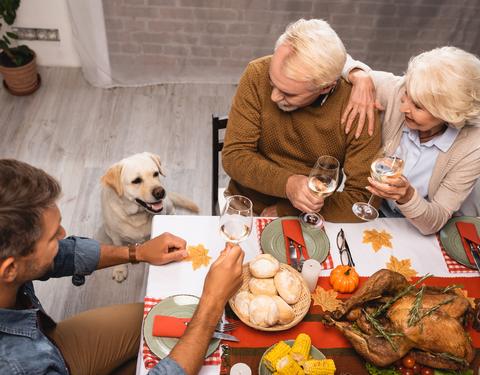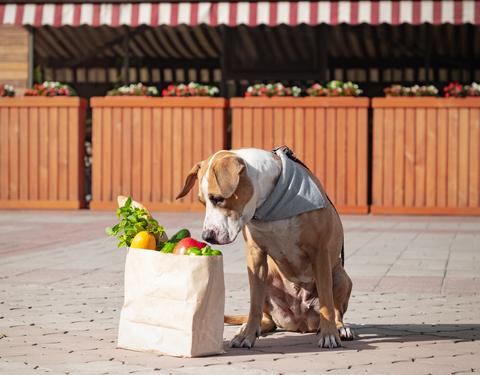
Overloading and overflowing your holiday table with yummy foods and tasty treats is rewarding. After planning, shopping, preparing, and cooking for hours on end in the kitchen, it’s time to indulge, enjoy, and gather around the table for a nice, home-cooked meal.
As you start to load your plate up, it’s inevitable that you want to sneak a bite or two down to your friend patiently waiting under the table. They’re giving you those irresistible puppy dog eyes.

While your dog may get a bite or two from you, he or she may also be getting a bite or two from everyone else around the dinner table. It’s important that you’re aware of what table scraps fido is getting, as some of these foods may be potentially harmful or toxic to their cute, four-legged existence.
So, in today’s article, we’ll be touching on all the foods that your pup may need to stay away from when it comes to holiday snacks and treats as well as how you can ensure that your pup doesn’t fall victim or harmed due to the holiday cheer.
Let’s clean up for supper!
Eight Holiday Foods that are Bad for Your Dog
Before we get into all the dishes, treats, and goodness, we need to start off by saying that certain foods are a big “no” for our furry friends.
1. Ham
Ham is a wonderful protein source, for us humans. It’s easily forgivable to assume that your four-legged friend would benefit from this juicy goodness too, right?
To be quite frank, pork products can be extremely harmful to dogs, causing vomiting, diarrhea, upset stomachs, and pancreatitis. Ham is high in fat, which can contribute to obesity in pets. Even a small bite can add on more than a few calories for your pet’s daily intake.
2. Turkey Bones & Skin
The holiday turkey is often the center of attention on the table, the labor-intensive craft of love, the item that everyone awes over, the center piece for looks.
Turkey is a great source of protein for us and our canines but may be of grave danger with holiday recipes adding fats and aromas for flavor. The skin is often the source of the most delectable flavors a turkey can offer. However, feeding turkey skin to your dog may lead to toxic exposures.
Turkey bones can also be very harmful to your furry friend. Bones can become stuck in their intestines, needing surgical removal. They can splinter, causing damage or irritation to your dog’s gastric and or esophageal lining. Abdominal infections could lead to death if turkey bones were to puncture any vital organs.
3. Onions and Garlic
These foods contain many aromatic foods that are often foundational ingredients in our everyday cooking. Garlic, chives, onions, shallots, and leeks may all be apart of this group, in whichever form imaginable.

Signs and symptoms of allium poisoning may only present themselves days after ingestion. Symptoms to watch out for in your dog may include:
- Developed anemia
- Dark urine
- Weakness
- Lethargy
- Diarrhea
- Abdominal pain
- Loss of appetite
- Vomiting
4. Mashed Potatoes
Oh those scrumptious, yummy, garlicky, creamy, and buttery mashed potatoes. Some may even call them the greatest carb side for any occasion. Unfortunately, these can make your dog sick. But, if the potatoes are unadulterated and cooked, they can make a great addition to your dog’s diet.
They are rich in Vitamin B6, Vitamin C, iron, and even magnesium. And of course, you don’t want your furry friend to miss out on the carb heaven action, so make them a side of cooked potatoes (plain of course). Do note though, if your dog has diabetes, potatoes can cause a blood sugar spike and this should be avoided, no matter the celebration.
If a sweet potato dish on also on your holiday menu, try and refrain from giving your furry friend a bite or two as well. As most holiday dishes do, these plates may have spices like cinnamon and nutmeg in them, which may be very unsafe for pets. Nutmeg, for instance, contains myristicin, which can cause hallucinations, dry mouth, abdominal pain, increased heart rate, and possible seizures in dogs.





